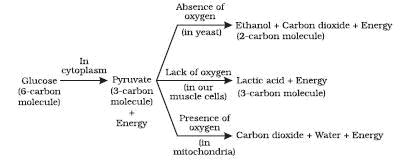Solution :
Glucose
The most important source of energy for all living things is glucose.
The most important carbohydrate that comes from the food we eat is glucose. To give the body energy, glucose is oxidised.
The different processes by which glucose is broken down are mentioned below.
Aerobic Respiration
Aerobic respiration occurs only in the presence of oxygen.
In aerobic respiration, there are three specific processes, which are glycolysis, the Krebs cycle and the electron transport chain (oxidative phosphorylation).
This process involves the conversion of glucose to pyruvate during glycolysis, and the same pyruvate also generates energy along with carbon dioxide and water.
Anaerobic Respiration
In the absence of oxygen, anaerobic respiration takes place.
Without oxygen, two different types of fermentation can take place.
Alcoholic Fermentation
In yeast, alcohol is produced through the process of fermentation. Because there is no oxygen present, only glycolysis can take place, and glucose is converted to pyruvate at the end of the process.
The fermentation of alcohol causes the pyruvate to become ethyl alcohol.
Fermentation of lactic acid
Because there isn’t enough oxygen in the system, lactic acid fermentation takes place.
Lactic acid is produced and accumulated in anaerobic conditions in the muscles, where it occurs.

